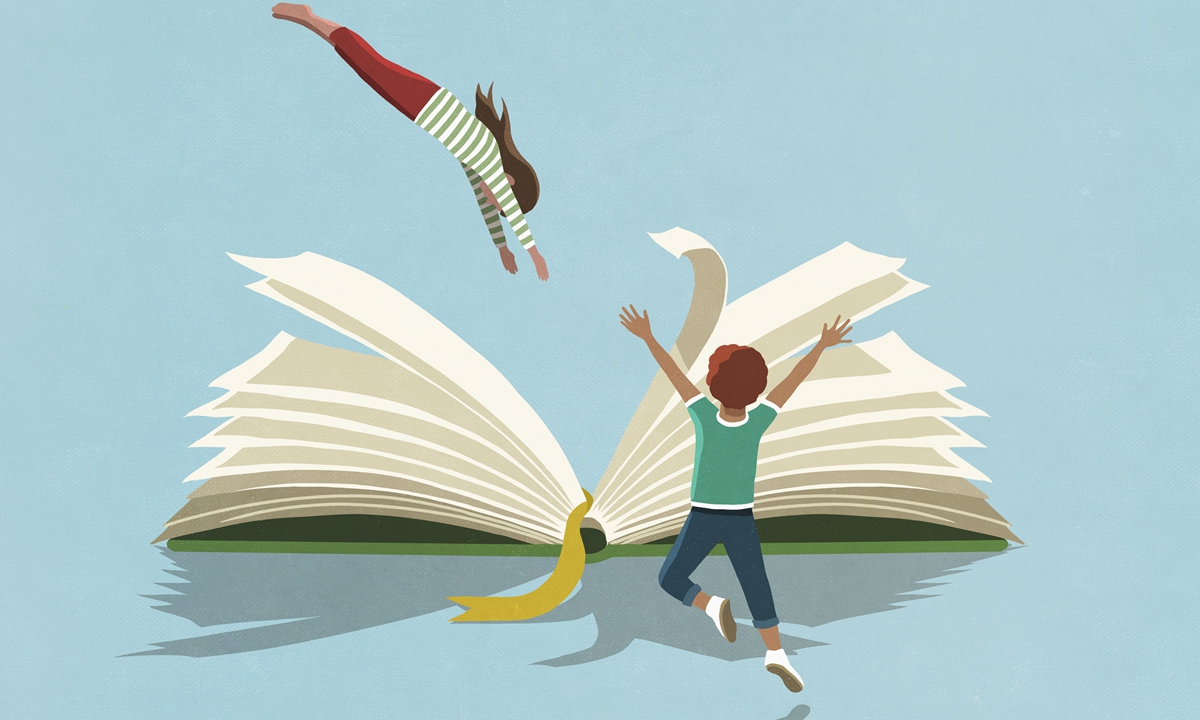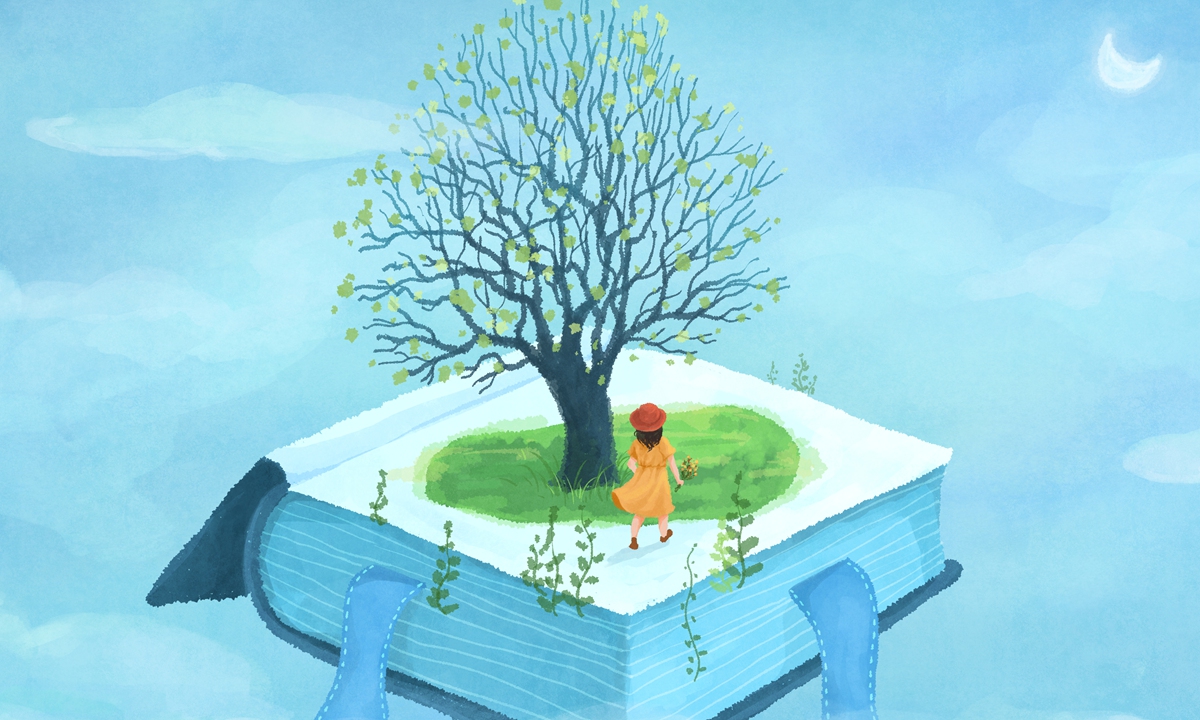MY READING LIFE / STUDENTS' WORKS
Albom's memoir reminds me that hardship can also nurture optimism
Philosophy of life
Editor's Note:
"Read ten thousand books, and your pen will be guided as if by the gods" is an ancient Chinese idiom that can be seen in students' textbooks. China's Ministry of Education has published an action plan to further promote reading among students across the nation. With new and diverse book recommendations, the reading scene is expected to be revived not only at schools, but also across society. To contribute to this endeavor, the Global Times launched "My Reading Life" essay contest for middle school students.
Please pick up a pen and share your stories with us at reading@globaltimes.com.cn
Participants will be rewarded once the article has been selected.

The book is a memoir by Mitch Albom that recounts the author's conversations with his former college professor, Morrie Schwartz.
After learning that Morrie is terminally ill with ALS (amyotrophic lateral sclerosis), Mitch reconnects with him and begins visiting him every Tuesday. Through these meetings, Morrie shares his insights on life, love, work, family, aging, and death.
The book tells us what is life and what should we do to improve ourselves. It describes an old man and a young man chatting with each other in what I think is a very interesting manner.
Morrie is the best teacher who gives the author much benefit and improves his mind a lot. The story began on a Tuesday afternoon.
"Do I wither up and disappear, or do I make the best of my time left?"
When ALS - a brutal, unforgiving illness of the neurological system - was found in Morrie's body, this is the question he asked himself.
So, what was his decision?
He didn't quit. Instead, he hobbled into the classroom, his home for more than 30 years. Because of his cane, he took a while to reach the chair. Finally, he sat down, dropped his glasses off his nose, and looked out at the young faces who stared back in silence.
I think Morrie felt very sad but also happy, because despite having an illness, he was still able to feel the love from his students, his children and see them live happily in the beautiful world.
He told his secret to everyone who was in the class. He said that he may not live to finish the semester because he has a fatal illness.
He would not wither. He would not be ashamed of dying. Yes, I agree with that.
In the mornings, Morrie always felt around his body and mourned what he had lost. He mourned the slow, insidious way in which he was dying.
He gave himself a good cry if he needed. And he concentrated on all the good things he still had in his life: on the people who were coming to see him, on the stories he was going to hear, on each beautiful thing in his few last moments of life.
Reading this book, I thought a lot and learned a lot.
I agree with Morrie's opinion and I admire Morrie a great deal. He had a nice attitude to face the challenges in his life and he had an optimistic heart even though he knew that he didn't have much time left to live.
What can we learn from Morrie?
When we meet different kinds of challenges, we can stay happy and never give up, to be confident and brave.
The story has also reminded me of an inspiring line that was written by Chinese poet Gu Cheng.
It says, "Dark night has given me my dark eyes, Yet I use them to search for light."
Mitch Albom also wrote another stellar book that is called The Five People You Meet in Heaven. I think the book is very nice and full of wisdom.
Mitch Albom is a US author, journalist, and broadcaster. His writing often explores themes of life, death, and the human experience, blending personal stories with universal lessons.
In addition to his literary work, Albom is involved in various charitable efforts. His ability to convey deep emotional truths has resonated with readers around the world.
The author is a student at the Beijing No.80 High School
"Read ten thousand books, and your pen will be guided as if by the gods" is an ancient Chinese idiom that can be seen in students' textbooks. China's Ministry of Education has published an action plan to further promote reading among students across the nation. With new and diverse book recommendations, the reading scene is expected to be revived not only at schools, but also across society. To contribute to this endeavor, the Global Times launched "My Reading Life" essay contest for middle school students.
Please pick up a pen and share your stories with us at reading@globaltimes.com.cn
Participants will be rewarded once the article has been selected.

Photo: VCG
Among many of my favorite books, the one that is called Tuesdays with Morrie has touched me the most.The book is a memoir by Mitch Albom that recounts the author's conversations with his former college professor, Morrie Schwartz.
After learning that Morrie is terminally ill with ALS (amyotrophic lateral sclerosis), Mitch reconnects with him and begins visiting him every Tuesday. Through these meetings, Morrie shares his insights on life, love, work, family, aging, and death.
The book tells us what is life and what should we do to improve ourselves. It describes an old man and a young man chatting with each other in what I think is a very interesting manner.
Morrie is the best teacher who gives the author much benefit and improves his mind a lot. The story began on a Tuesday afternoon.
"Do I wither up and disappear, or do I make the best of my time left?"
When ALS - a brutal, unforgiving illness of the neurological system - was found in Morrie's body, this is the question he asked himself.
So, what was his decision?
He didn't quit. Instead, he hobbled into the classroom, his home for more than 30 years. Because of his cane, he took a while to reach the chair. Finally, he sat down, dropped his glasses off his nose, and looked out at the young faces who stared back in silence.
I think Morrie felt very sad but also happy, because despite having an illness, he was still able to feel the love from his students, his children and see them live happily in the beautiful world.
He told his secret to everyone who was in the class. He said that he may not live to finish the semester because he has a fatal illness.
He would not wither. He would not be ashamed of dying. Yes, I agree with that.
In the mornings, Morrie always felt around his body and mourned what he had lost. He mourned the slow, insidious way in which he was dying.
He gave himself a good cry if he needed. And he concentrated on all the good things he still had in his life: on the people who were coming to see him, on the stories he was going to hear, on each beautiful thing in his few last moments of life.
Reading this book, I thought a lot and learned a lot.
I agree with Morrie's opinion and I admire Morrie a great deal. He had a nice attitude to face the challenges in his life and he had an optimistic heart even though he knew that he didn't have much time left to live.
What can we learn from Morrie?
When we meet different kinds of challenges, we can stay happy and never give up, to be confident and brave.
The story has also reminded me of an inspiring line that was written by Chinese poet Gu Cheng.
It says, "Dark night has given me my dark eyes, Yet I use them to search for light."
Mitch Albom also wrote another stellar book that is called The Five People You Meet in Heaven. I think the book is very nice and full of wisdom.
Mitch Albom is a US author, journalist, and broadcaster. His writing often explores themes of life, death, and the human experience, blending personal stories with universal lessons.
In addition to his literary work, Albom is involved in various charitable efforts. His ability to convey deep emotional truths has resonated with readers around the world.
The author is a student at the Beijing No.80 High School



